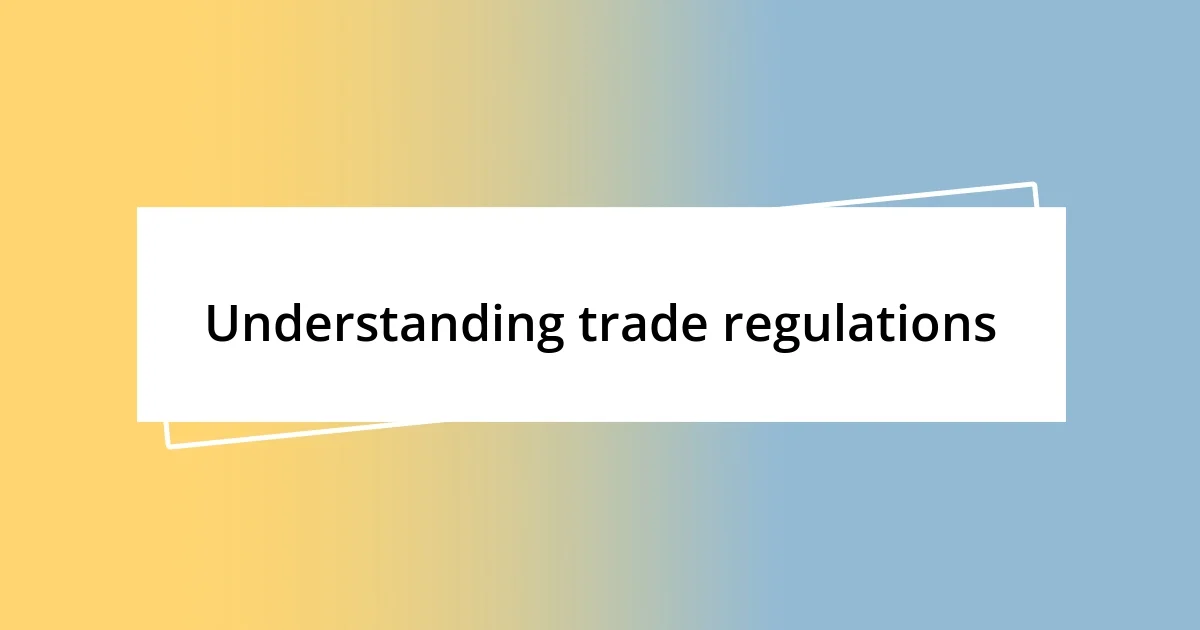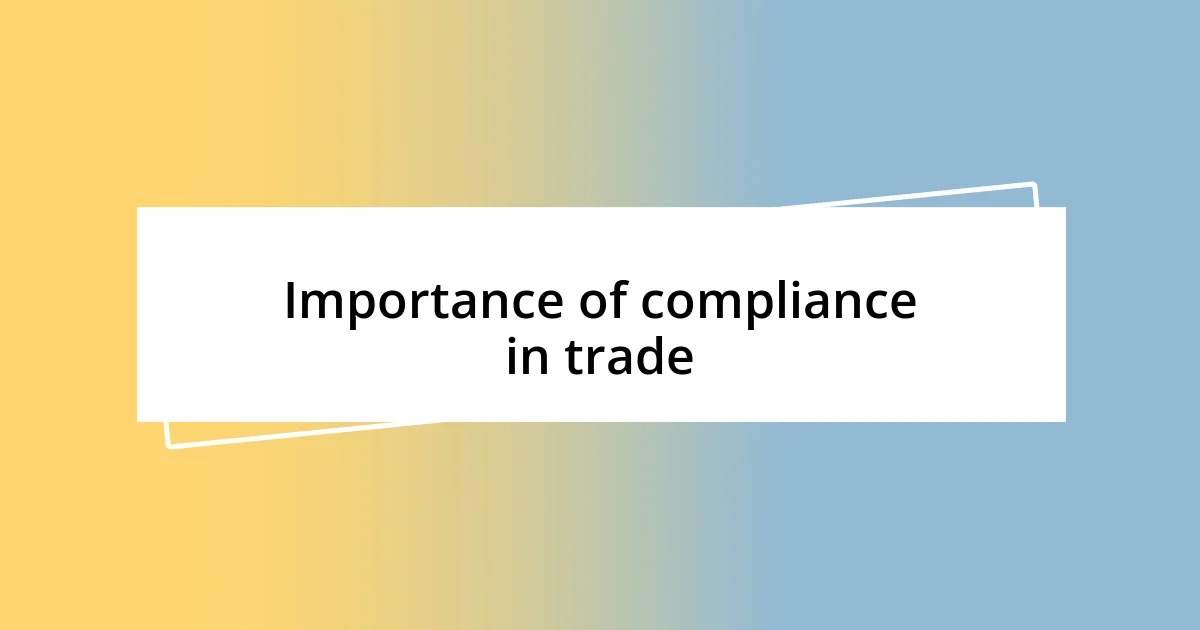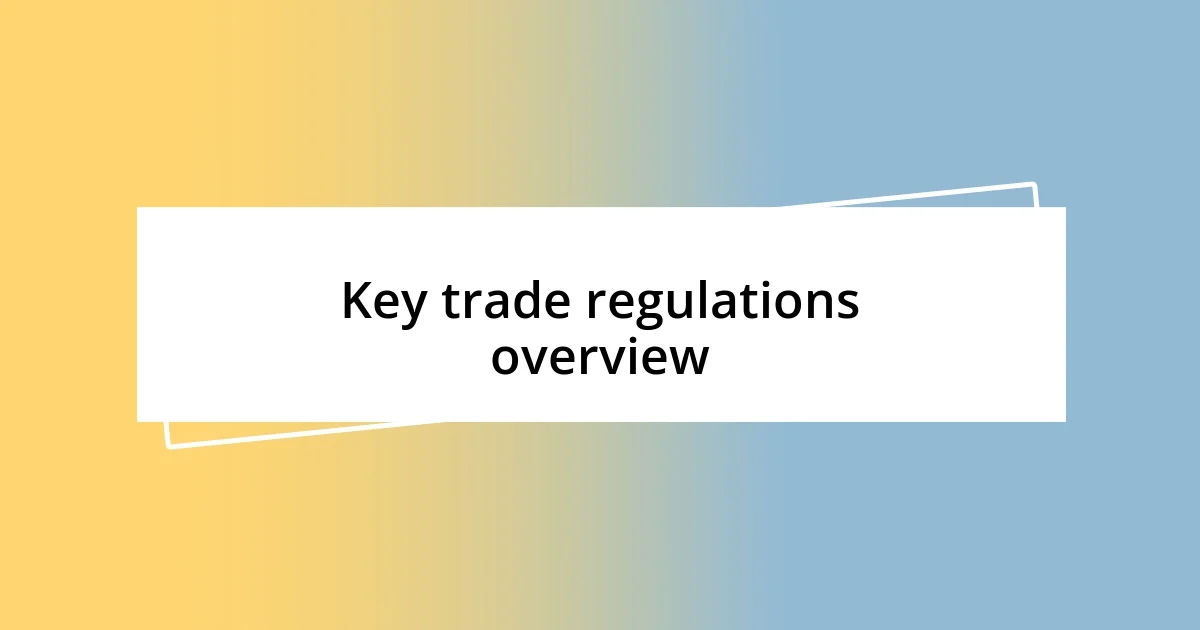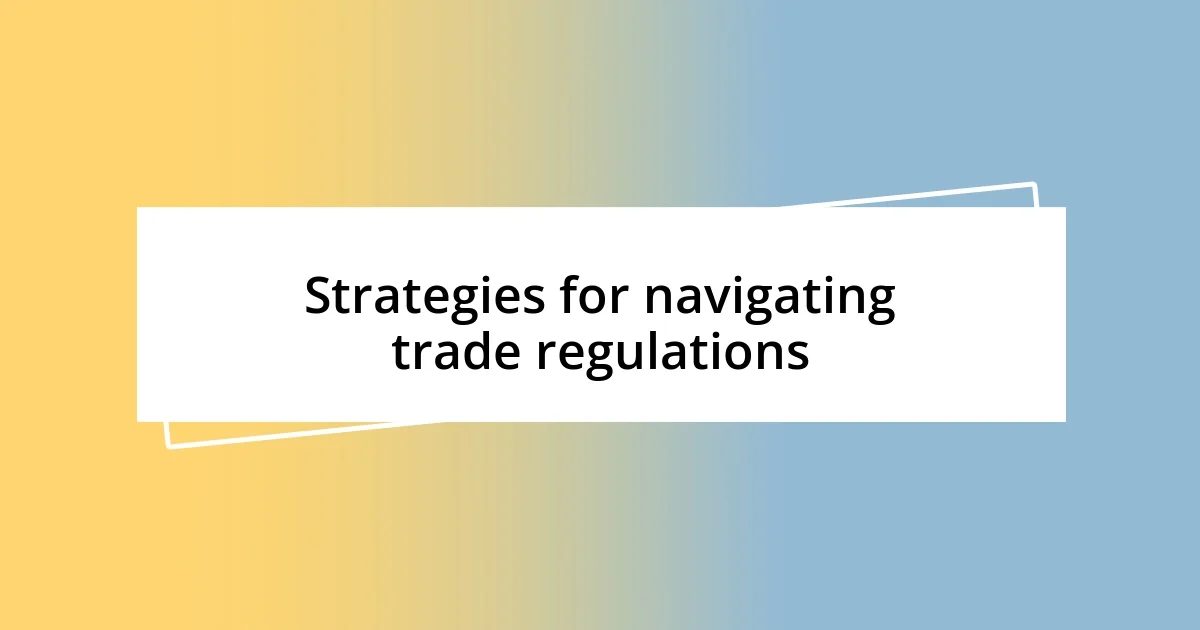Key takeaways:
- Understanding trade regulations is crucial for businesses to avoid costly delays and build strong relationships with partners.
- Compliance can serve as a strategic advantage, leading to smoother operations, market access, and potential innovations.
- Utilizing resources like government guidelines, industry associations, and compliance technology is essential for maintaining adherence to trade regulations.

Understanding trade regulations
Trade regulations can sometimes feel like a dense jungle—a complex web of rules that vary from one country to another. I remember my first encounter with customs regulations during an import process; the paperwork was overwhelming, and I couldn’t help but feel anxious. How could something so necessary lead to such confusion? It made me realize just how crucial it is to navigate these regulations carefully to avoid costly mistakes.
In my experience, understanding trade regulations isn’t just about knowing the laws but also about being aware of how they impact business relationships. I learned this the hard way when a minor regulation misunderstanding resulted in a delay for my shipment. The frustration I felt was palpable, and I wondered—had I done enough to educate myself beforehand? It highlighted the fact that being well-informed can save businesses both time and money.
Trade regulations are designed to protect economies and ensure fair competition, yet they can sometimes feel restrictive. I had a moment of clarity during a workshop on compliance where the speaker emphasized that these regulations exist for safety. It made me question—what would our world look like without such frameworks? Embracing this understanding ultimately helped me see trade regulations not as obstacles but as necessary guidelines to foster healthier market environments.

Importance of compliance in trade
Compliance in trade is absolutely vital for maintaining smooth operations. From my own experiences, I’ve learned that neglecting compliance can lead to significant setbacks. I once faced a situation where a missed regulation on labeling resulted in my shipments being held at customs for weeks. That time lost felt agonizing, especially as it impacted my relationship with clients who were eagerly awaiting their orders.
Here are some key reasons why compliance in trade is crucial:
-
Avoiding Legal Penalties: Non-compliance can lead to hefty fines and legal action. I once saw a colleague nearly lose their business due to mounting penalties, and it served as a stark warning.
-
Building Trust with Partners: Compliance fosters stronger relationships with suppliers and customers. When they know you adhere to the rules, it builds confidence in your partnership.
-
Facilitating Market Access: Regulatory compliance opens doors to larger markets. When I ensured my products conformed to new trade laws, I was able to enter a previously inaccessible region, broadening my customer base significantly.
Adherence to trade regulations isn’t just a regulatory checkbox; it’s a strategic advantage. I’ve found that companies that prioritize compliance often enjoy smoother operations, better reputations, and a sense of security in their business dealings.

Key trade regulations overview
Trade regulations encompass a variety of laws concerning imports and exports, from tariffs to technical standards. I recall sitting in a conference, listening to experts discuss how regulations can change based on geopolitical shifts. It hit me—that something as mundane as a tariff could impact not only my pricing strategy but also my competitive edge. This realization opened my eyes to the intricate dance businesses have to perform to stay compliant while remaining profitable.
Additionally, I discovered that trade regulations often require meticulous attention to detail. I once had to pivot quickly when new export controls were enacted overnight. The stress of adapting my business model to meet these new requirements felt overwhelming, yet it taught me the importance of agility in trade. By actively monitoring regulatory updates, I learned that staying informed can turn challenges into opportunities.
Now, let me present a comparison of some key trade regulations that every business should keep in mind.
| Regulation Type | Key Purpose |
|---|---|
| Tariffs | Impose taxes on imports to protect domestic industries |
| Import Quotas | Limit quantity of specific goods to control market supply |
| Export Controls | Restrict export of goods for national security and foreign policy reasons |
| Customs Regulations | Ensure compliance with trade laws and efficient border processing |

Impact of regulations on businesses
Navigating trade regulations has significantly shaped my approach to business. I vividly remember a project where I underestimated the impact of export controls. As a result, my initial excitement about expanding to a new market quickly turned into frustration when I had to halt operations. The emotional weight of those stalled shipments taught me that even a small miscalculation can ripple through the entire company.
I’ve often found that regulations can feel like a tangled web. When I was introduced to new tariffs unexpectedly, it required me to have tough conversations with my team about cost adjustments and potential price increases. How do you handle those discussions without alienating your clients? In my experience, transparency helped. Sharing my struggles and strategies with customers turned doubts into discussions, fostering a stronger relationship based on trust.
On the flip side, compliance is not just about avoiding pitfalls; it can also serve as a catalyst for innovation. I recall needing to redesign a product to meet new safety standards. Initially, it felt like a burden, but that process sparked creativity within my team. We ended up with a superior product that set us apart, showing me how embracing regulations can lead to unexpected opportunities and growth.

Strategies for navigating trade regulations
When navigating trade regulations, I’ve found that building strong relationships with customs brokers can be a game changer. I remember the first time I reached out to one; it felt daunting, but having that expert by my side transformed a tedious task into a streamlined process. They acted not just as guides through the maze of paperwork but also as valuable resources who kept me updated on any shifts in regulations. Have you ever considered how much smoother your operations could be with the right ally in your corner?
Another strategy that’s proven vital is investing in compliance training for my team. It may seem like a burden at first—who wants to sit through another training workshop?—but I’ve seen firsthand how understanding the regulations empowers my employees. I still recall a session where we dissected recent changes; the excitement in the room was palpable. One of my team members even suggested new workflows that could preemptively address potential compliance issues. Isn’t it incredible how knowledge can turn confusion into clarity and efficiency?
Finally, staying proactive rather than reactive has helped me tremendously. There were moments when I felt overwhelmed, buried under a mountain of regulatory obligations. I learned that setting regular check-ins to review compliance and monitor upcoming changes lightened that load. Additionally, I established a habit of reading industry newsletters—those little insights often serve as early warning sirens. Reflecting on this, wouldn’t you agree that taking the initiative can set a solid foundation for resilience in an ever-evolving regulatory landscape?

Resources for staying compliant
Staying compliant in a landscape full of regulations can feel daunting, but I’ve found some incredible resources that make the journey smoother. For instance, I regularly turn to the websites of government trade departments. They often provide clear guidelines, updates on regulations, and even tools like compliance checklists. Have you ever tried using these resources? They can really demystify complex requirements and keep your business informed.
Another avenue I utilize is industry associations. By joining organizations related to my field, I gain access to valuable networks and resources. It was through one such association that I stumbled upon webinars focusing on compliance best practices. Those sessions not only enhanced my understanding but also connected me with peers who shared their experiences. I remember one discussion about the intricacies of import quotas; hearing how others tackled similar hurdles was reassuring and insightful. Isn’t it comforting to know you’re not alone in navigating these challenges?
Lastly, I strongly recommend leveraging technology for compliance. Investing in software dedicated to regulatory compliance has been a true lifesaver for my business. I recall the moment we integrated a compliance management system—it streamlined processes immensely and took the pressure off my team. Real-time alerts and tracking features helped us stay ahead of changes instead of scrambling at the last minute. Have you thought about how tech could lighten your compliance burden? In my experience, the right tools are transformational, turning a potential nightmare into a manageable task.

Personal experiences and lessons learned
Reflecting on my experiences with trade regulations, I can’t help but think about the significant learning curve I faced early on. My first freight shipment was a whirlwind of confusion; I vividly remember standing in front of mountains of paperwork, feeling utterly lost. It was in that moment of frustration that I realized the importance of attention to detail. Has there ever been a task that felt so overwhelming it made you question your path? For me, it ignited a determination to never feel that helpless again, leading me to meticulously review each regulation and ensure compliance became second nature.
One lesson that stands out is the value of mentorship. I was fortunate to have a colleague who had been in the trenches much longer than I had. Their willingness to share insights and anecdotes transformed my approach to trade regulations. I clearly recall them saying, “You’re not breaking the rules; you’re learning the ropes.” It struck a chord with me. Isn’t it uplifting to have someone believe in your journey? This experience taught me that seeking guidance not only clarifies complexities but also fosters a supportive community, turning compliance into a collaborative endeavor.
Interestingly, I’ve learned that flexibility is crucial. Once, when unexpected regulatory changes emerged, I panicked, feeling like everything I had built was at risk. However, after taking a deep breath and reevaluating my processes, I noticed I could adapt without compromising core operations. It made me ask: when was the last time a sudden shift turned into an unexpected opportunity for growth in your work? Embracing that unwelcome change allowed me to evolve, reinforcing the idea that resilience and adaptability can coexist with a commitment to compliance.














